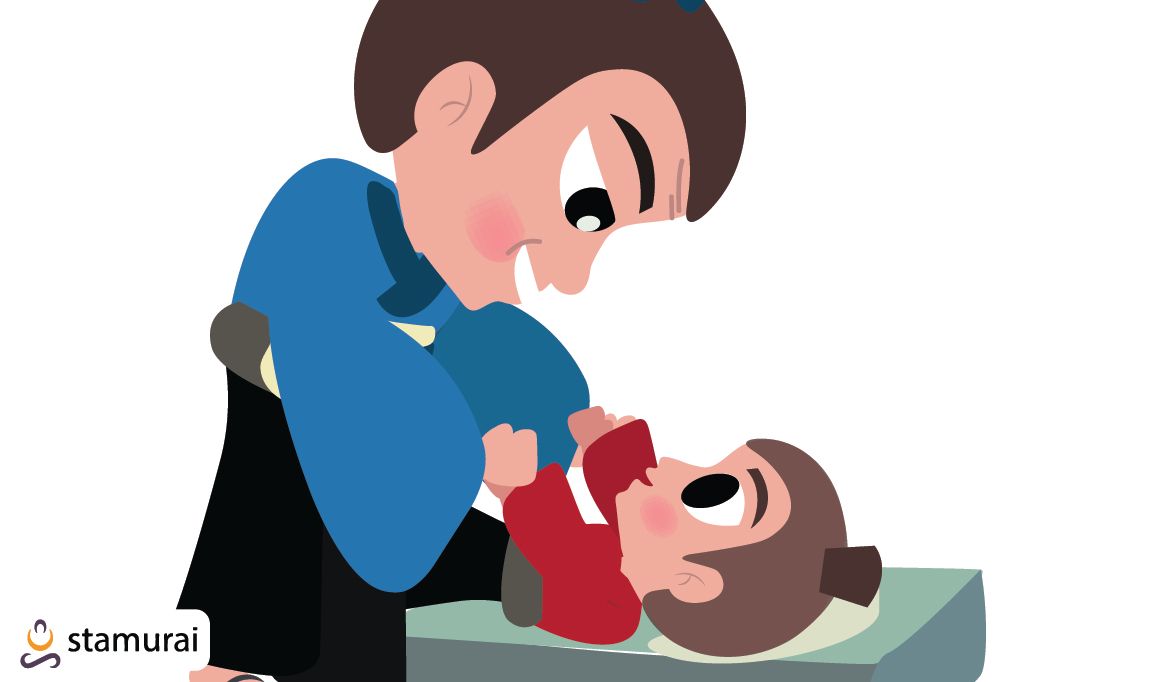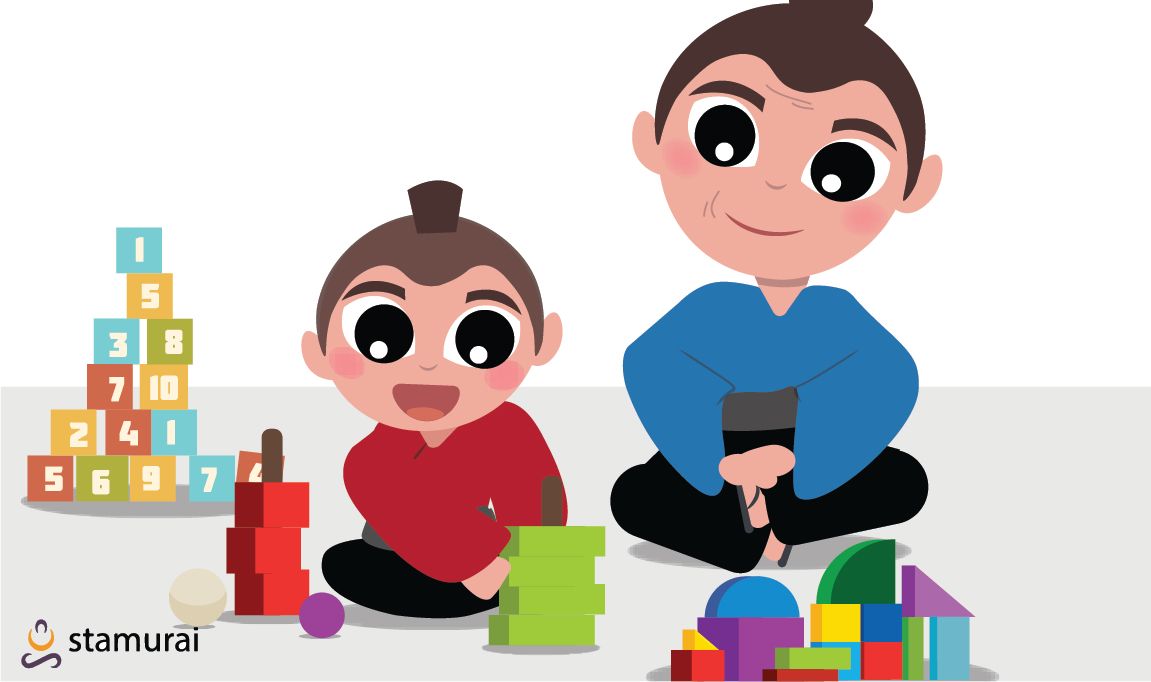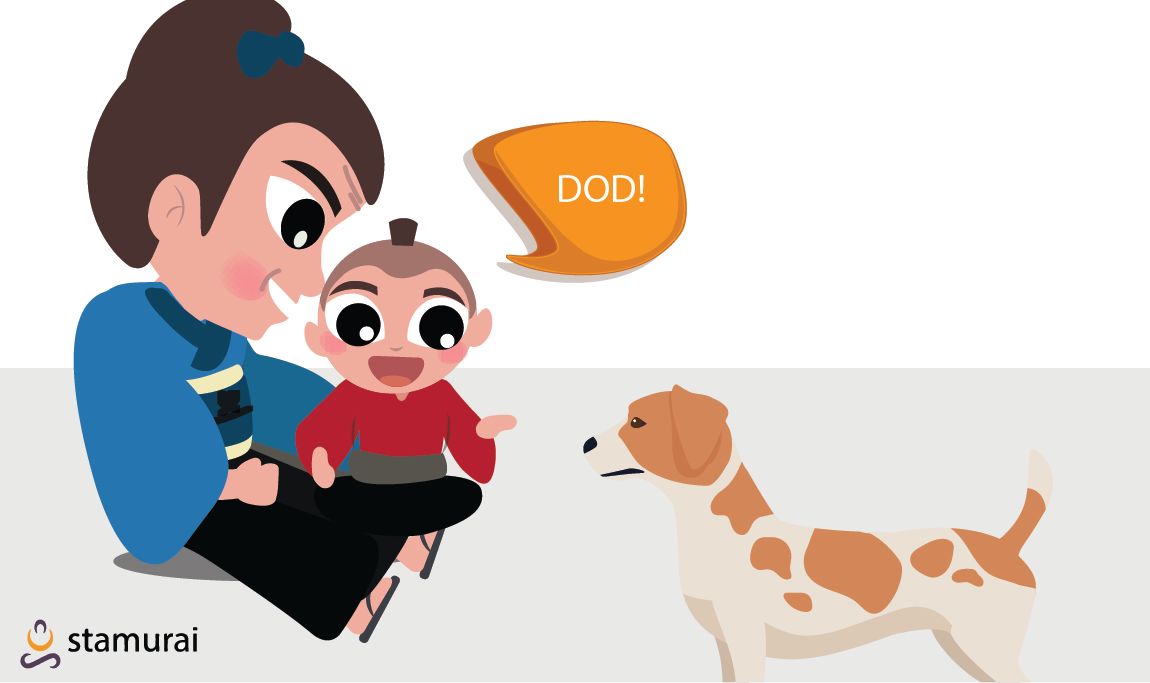The first three years of a child's life are crucial in terms of speech and language development. Children develop receptive language abilities long before they acquire expressive language. In simpler words, even babies as young as 6-months of age can recognize their mother's and father's voices and tones. However, it may take between 10 to 12-months for a child to say their first words.
Expressive language begins when a child can use gestures, grunts, sounds, or vocalizations to express their intentions. As their understanding of receptive language increases, their expressive language also begins to develop.
Not all children begin to use expressive language at the same time. So, how can you encourage your child to meet their speech and language milestones on time? What are some good ways to promote language development in infants and toddlers? Here in this post, we will discuss exactly that!
Read on to learn about the 17 expert-approved tips on how to promote language development in kids at home -
1. Spend Quality Time Together
This one may sound obvious. But, it is perhaps the best speech and language development advice for parents. Sitting side by side watching television may sound quaint after a long day at work, but it may not stimulate your baby’s language development.
Try to have fun together. You can sing songs, make funny faces, or talk in funny voices using sock puppets. It may seem silly to an adult, but it will get the child to pay attention.
Making your child emote is a significant step towards the development of strong communication skills.
2. Gain Your Baby’s Attention
When you decide to spend some time with your child, sit facing them. Turn the TV and your phone off for a couple of minutes. It’s one of the best strategies to promote language development in babies.

Begin by talking about something your child seems interested in. If they are playing with a train set, talk about the sounds a train makes and how fast they run.
That will help your child learn what different words mean.
3. Don’t Demand Answers
Try not to ask too many questions to your child. Instead, comment on what they are doing, where they are pointing, or what they are holding.
Asking questions may seem testing to a child. Making simple comments may make it feel like a conversation.
Let them make gestures and vocalizations while you comment on their actions.
4. Give Them Time
Imagine trying to converse with someone who asks questions but doesn't allow you to think. It can be incredibly frustrating even for adults! So, why do it with children?
If you have to ask a question, please give your child enough time to think about the response. Be sure to hold eye contact and not express impatience while waiting for a reply.
5. Say It. Repeat It.
Don't shy away from repeating what you say to your baby. Unlike adults, babies have rapidly developing receptive language. Repetition makes it easier for the baby's swiftly developing brain to grasp new sounds, words, expressions, and emotions.
Babies and toddlers learn faster when you repeat new words, phrases, and sentences. In fact, it is one of the key aspects of "baby talk."
6. Engage In Baby Talk
Forget the articles that say baby talk is harmful! Correctly leveraged baby talk actually stimulates a baby's brain and enables them to focus on the speaker.
How to execute baby talk or infant-directed speech correctly?
- Do not mispronounce words.
- Call objects by their correct names.
- Use simple language.
- Use short sentences.
- Make funny voices.
- Make funny faces.
- Try different pitches and tones.
Remember these 7-steps, and you should have your baby's attention in no time!
Such simple activities for encouraging speech & language development in children at home can be planned & implemented quite easily.
7. Learn and Use Parentese
Parentese is not the new baby talk! It is a fully-functional, grammatically correct language involving real words.
Parentese or parent-directed speech has been developed for the ease of parents and babies. It encourages a baby's receptive and expressive skills, and, at the same time, it enables a parent to grab their child's attention without too much ado.
It involves elongated vowels and exaggerated tones that babies find intriguing and funny. For example, instead of abruptly shortening a sentence like "baby like apple," you would say, "oh, you like apples" or "you want apples."
Although it seems more complex than traditional baby talk, it helps a child understand and subsequently learn the syntaxes of a language quickly. So, be sure to use this technique to promote language development in your child.
8. Use Real Words Only
While talking to or in front of your baby, be sure to use real words to encourage speech & language development.
It’s alright for your 6-month old to say “bo-bo” when they want their bottle, but it’s not okay for you to call their bottle “bo-bo” in front of them.
Whenever your baby points at something and vocalizes, use the correct term each time. Using the right words will help expand the child's vocabulary. For example, if your baby points towards the bottle and says "bo-bo," you can say, "you want the bottle!"
9. Watch Their Expressions and Gestures
Before your baby is 15-months old, they will understand a lot more than they can say. Therefore, it is crucial to pay attention to what they are doing with their hands and facial expressions.
Children may express their thoughts and emotions through hand movements. For example, they can wave their hands at you. Depending on the time, you can say "hello" or "bye-bye." Or, when they point at their toys, you can say, "you want the teddy!"
Serve-and-return interactions will encourage their non-verbal communication skills and add to their expanding vocabulary. When you understand how children learn a language, it's easier to promote speech & language development in them.
10. Arrange Playdates
You can organize activities with children of similar ages. Talk to their parents or get in touch with parent groups on social media who organize playdates in your area.

Interacting with other children their age will boost their non-verbal and verbal communication. Being around other children will give them the opportunity to listen and test their skills in a social setup.
Real-life interactions are important for a child. Playdates will boost their speech and language skills. And also enable them to understand social communication.
11. Build On Their Words
When your child is around 18-months, they will begin to use two-word sentences. You can boost the development of two-word sentences by adding to or piggybacking words.
For example - if your 12-month old says, "ball." You can always add to that and say, "Red ball," "small ball," or "throw ball."
Teach your child to string two or more words together to create sentences. It will help them reach the age-based speech and language milestones without delay!
12. Provide Positive Feedback
Children are more receptive than we think. Positive feedback can encourage them to use more words and exercise their expressive language skills.

Refrain from correcting their speech every time. This is not how you assist your child with language development. It is more important to pay due attention to the content of the message than the syntax or grammar.
For example, if your child says, "look dod," you can say, "oh yes. That is a dog." Recognize and acknowledge what your child has to say to you instead of correcting them.
13. Follow Your Baby’s Lead
Not all individuals are interested in the same things! Your baby may be more interested in the mobile hanging on top of their crib, more than your smartphone. So, when you are considering games, activities, or exercises that promote language development in kids, it is a good idea to consider what your child likes or responds to.
Notice what they are looking at and use that as a cue to begin a “conversation.” Start talking about the different shapes or various animals hanging from their mobile. Make animal noises and hold their attention.
14. Introduce Variations in Your Tone and Pitch
While talking to your child, you cannot use the same voice you use for your zoom meetings!
A baby has a short attention span. To keep them hooked to what you are saying, you need to vary the pitch and tone of your voice. You can make funny noises – switch between a chirpy birdie voice, squeaky mouse voice, and gruff big-dog voice to keep the conversation interesting.
Soon, your child will try to copy the funny voices and the words you say. It's a great strategy for encouraging language development in kids.
15. Add Some Tune and Rhythm
Children of all ages love music! Instead of turning to your iPad or laptop, try to sing nursery rhymes to them.
Most nursery rhymes have great opportunities for vocalizations, making funny noises and voices. Singing nursery rhymes is a smart and easy way to demand a child's attention and hold it. This is among the best language development activities for young children
Once they are a little older than 12-months, they will begin to vocalize with you and try to mimic the words, even though they can sing along perfectly!
16. Read To Your Baby Regularly
Now, you may wonder – ‘what’s the point of reading to a baby who doesn’t do anything beyond cooing?’
Reading a well-illustrated book with short and simple words will introduce them to a world of new sounds accompanied by visual cues. Take time to read slowly, enunciate carefully and describe the images on each page to your child.

Talk about the pictures. Point at the characters and describe them. “Oooh. That’s a big lion,” “the little boy is happy!” or “the bird is in the tree” – simple descriptions like these will boost your child’s imagination as well as language skills.
17. Narrate What You Are Doing
Even when you are not directly talking to your child or facing them, describe what you are doing. It can be as banal as “Mommy is washing the dishes” or “Daddy is changing the diaper.”
Continuously talking around them and narrating tasks will allow your child to hear new sounds, words, and phrases. It will add to their vocabulary and boost their language development within the first 3-years.
Concluding Words
Every child reaches the speech and language milestones at their own pace. Do not compare your child's vocabulary or speech development to that of their cousins, siblings, or playmates. Follow expert advice on how to encourage speech & language development in young children.
If you believe that your child is showing signs of speech delay or language delay despite receiving the necessary stimulus, you should speak with a professional.
A speech-language pathologist (SLP) should be able to answer all questions and doubts regarding your child's speech and language development.
An SLP can analyze how your child performs with regards to speech & language milestones and if necessary, recommend appropriate activities or exercises.










